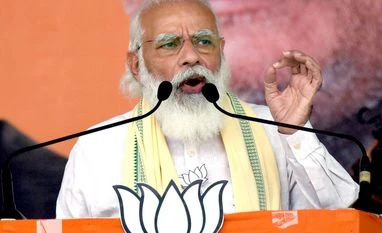The smooth highway coursing through Muzaffarpur into Mithilanchal is not only a gateway to a distinct cultural landscape but also a region of changed political narrative as the ruling BJP-JD(U) combine seeks to draw support from the poorest sections of society on the back of a number of welfare schemes to take on a resurgent RJD-led alliance.
The Mithila region was hit hard by floods, and a large section of the extremely backward communities (EBCs), whose numbers are higher than the state average in many seats here, and scheduled castes has benefited from the relief package, including cash transfer of Rs 6000, of Chief Minister Nitish Kumar-led state government.
And above all, it is the 'Brand Modi' that shines brightest in one village after another as people praise the prime minister for free ration, from April to November, and money transfer to the poor following the coronavirus pandemic outbreak and consequent lockdown.
"Jiska khayengein, usika gayengein, (Will sing the tune of the one who feeds us) " Shrawan Das, a Kahar which belongs to the EBC, says in Darbhanga town while a number of other such voters in Berua village in Gaighat constituency in Muzaffarpur reel out central government schemes that have led them to affirm their support to the ruling alliance.
"The government gave us money, food and cooking gas cylinder. What else does one want," one of them says.
While there are mixed views about Nitish Kumar as people acknowledge his work and also express disappointment with his latest term at the same time, Prime Minister Narendra Modi remains a reason for their solid support to the ruling alliance.
More From This Section
Assembly elections have often seen local issues and leadership take precedence in the mind of voters over national factors, including Modi's leadership, but things are a tad different in this part of Bihar as the polls come against the backdrop of the coronavirus crisis, with people benefitting from welfare measures.
Rajendra Ram, a dalit of Simri panchayat, expresses his anguish at not getting any cash transfer benefit like many other villagers but blames local government handlers for his pain.
"Modi treats everyone as equal. But our society and villagers discriminate against us. I will not blame Modi for this," he says, affirming his support to the NDA.
There are, however, voices of discontent in this north-central Bihar region with the state government and Kumar.
The chief minister, feted for long as a model of 'sushasan' (good governance), is now a source of conflictive narratives in which is he is at once a leader who has delivered a lot and is also someone who has grown disconnected with people and did not offer much in this term.
"How can I say he has not worked. But he confined himself to his residence during the coronavirus crisis while we suffered. He resisted migrants' return to home," Asha Devi, a resident of dalit colony of Sikandarpur in Muzaffarpur, says.
Kumar's prohibition policy draws more criticism from men and women, as they complain that it has only pushed the liquor trade underground.
"Afsarshahi" (bureaucratic highhandedness) is the common refrain in the criticism of the state government, especially from people linked to private enterprise, from transporters to owners of restaurants and small tea stalls.
In Keoti, RJD's senior leader Abdul Bari Siddiqui expresses confidence of prevailing upon his BJP rival Murari Mohan Jha due to "discontent" with the state government, but Sanjay Kumar, a local campaign manager of the saffron party, says the opposition grand alliance will be defeated across the region.
The rainbow caste coalition that propelled the National Democratic Alliance to win in 39 of 40 Lok Sabha seats in the state in the 2019 general election, may have eroded a little, but is still effective on the ground, its members say.
One factor that is, however, seemingly working against the JD(U) in a number of seats is the presence of Chirag Paswan-led Lok Janshakti Party candidates.
LJP candidate Komal Singh, daughter of party MP Veena Devi, is drawing visible support from a section of upper castes in Gaighat, and so is Vijay Prasad Singh in Kanti.
RJD leader Tejashwi Yadav's barnstorming across the state with more than twice and even thrice the number of daily public meetings held by Kumar has rallied the party's traditional support base around the 'mahagathbandhan' (grand alliance), and its leaders hope to sway a big section of EBC and dalit voters to their side to defeat the NDA.
The RJD-led alliance has also reached out to other communities by giving representation to them in their list, with 33 of 70 Congress nominees belonging to the upper castes.
With the RJD often tagged as a party of Yadavs and Muslims (MY), Yadav has asserted time and again it is now a party of A to Z.
Polling was held in 71 out of 243 Assembly seats on October 28 in the first phase. As the state heads to the second and third phase of polls on October 3 and 7, it is these most disadvantaged sections of society who hold the key to power.
For over 15 long years, a majority of them backed Kumar and then the BJP as Modi led his alliance to strong showings in Lok Sabha polls in 2014 and 2019.
Whether the old loyalties hold firm or break down will decide the fate of the NDA.
)